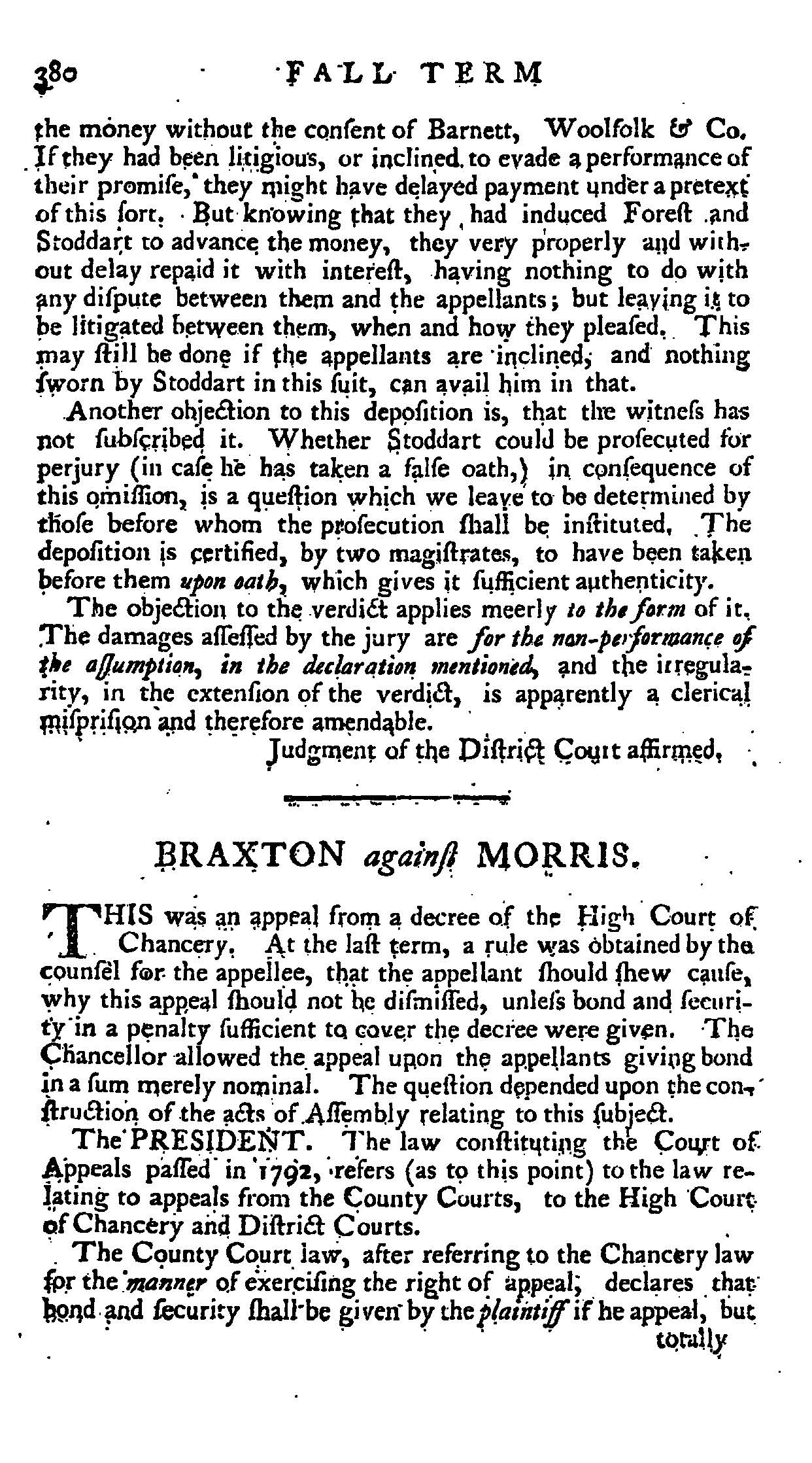Difference between revisions of "Braxton v. Morris"
m |
m (→Background) |
||
| (2 intermediate revisions by one other user not shown) | |||
| Line 1: | Line 1: | ||
{{DISPLAYTITLE:''Braxton v. Morris''}} | {{DISPLAYTITLE:''Braxton v. Morris''}} | ||
| − | [[File:WashingtonBraxtonvMorris1798v1p380. | + | [[File:WashingtonBraxtonvMorris1798v1p380.jpg|link={{filepath:WashingtonsReports1798V1BraxtonvMorris.pdf}}|thumb|right|300px|First page of the opinion [[Media:WashingtonsReports1798V1BraxtonvMorris.pdf |''Braxton v. Morris'']], in [http://wm-primo.hosted.exlibrisgroup.com/01COWM_WM:EVERYTHING:01COWM_WM_ALMA21560662660003196 ''Reports of Cases Argued and Determined in the Court of Appeals of Virginia''], by Bushrod Washington. Richmond: T. Nicolson, 1798.]] |
__NOTOC__ | __NOTOC__ | ||
[[Media:WashingtonsReports1798V1BraxtonvMorris.pdf |''Braxton v. Morris'']], 1 Va. (1 Wash.) 380 (1794),<ref>Bushrod Washington, ''[[Reports of Cases Argued and Determined in the Court of Appeals of Virginia]],''(Richmond: T. Nicolson, 1798), 1:380.</ref> is a short decision discussing whether a new legislative rule requiring monetary security could be satisfied by a nominal fee. | [[Media:WashingtonsReports1798V1BraxtonvMorris.pdf |''Braxton v. Morris'']], 1 Va. (1 Wash.) 380 (1794),<ref>Bushrod Washington, ''[[Reports of Cases Argued and Determined in the Court of Appeals of Virginia]],''(Richmond: T. Nicolson, 1798), 1:380.</ref> is a short decision discussing whether a new legislative rule requiring monetary security could be satisfied by a nominal fee. | ||
==Background== | ==Background== | ||
| − | The issue before the court regarded a new rule created by the legislature stating that an appellant should show cause as to why the appeal should not be dismissed, unless he or she gave monetary security as a penalty sufficient to cover the decision given. Chancellor Wythe allowed the appellant to appeal with a small (nominal) fee. The issue then came before the court as to the construction of the law and whether Wythe was right in taking such a small fee. | + | The issue before the court regarded a new rule created by the legislature stating that an appellant should show cause as to why the appeal should not be dismissed, unless he or she gave monetary security as a penalty sufficient to cover the decision given. [[George Wythe|Chancellor Wythe]] allowed the appellant to appeal with a small (nominal) fee. The issue then came before the court as to the construction of the law and whether Wythe was right in taking such a small fee. |
| + | |||
===The Court's Decision=== | ===The Court's Decision=== | ||
The Court of Appeals decided that Wythe took only as much as he was required to by the statute and although there seemed to be an issue in the legislature’s drafting of the law, the Court determined it was the legislature's job, and not the Court's to fix it. | The Court of Appeals decided that Wythe took only as much as he was required to by the statute and although there seemed to be an issue in the legislature’s drafting of the law, the Court determined it was the legislature's job, and not the Court's to fix it. | ||
| Line 18: | Line 19: | ||
[[Category: Cases]] | [[Category: Cases]] | ||
| + | [[Category: Procedure]] | ||
Latest revision as of 14:41, 5 September 2018

Braxton v. Morris, 1 Va. (1 Wash.) 380 (1794),[1] is a short decision discussing whether a new legislative rule requiring monetary security could be satisfied by a nominal fee.
Background
The issue before the court regarded a new rule created by the legislature stating that an appellant should show cause as to why the appeal should not be dismissed, unless he or she gave monetary security as a penalty sufficient to cover the decision given. Chancellor Wythe allowed the appellant to appeal with a small (nominal) fee. The issue then came before the court as to the construction of the law and whether Wythe was right in taking such a small fee.
The Court's Decision
The Court of Appeals decided that Wythe took only as much as he was required to by the statute and although there seemed to be an issue in the legislature’s drafting of the law, the Court determined it was the legislature's job, and not the Court's to fix it.
See also
References
- ↑ Bushrod Washington, Reports of Cases Argued and Determined in the Court of Appeals of Virginia,(Richmond: T. Nicolson, 1798), 1:380.